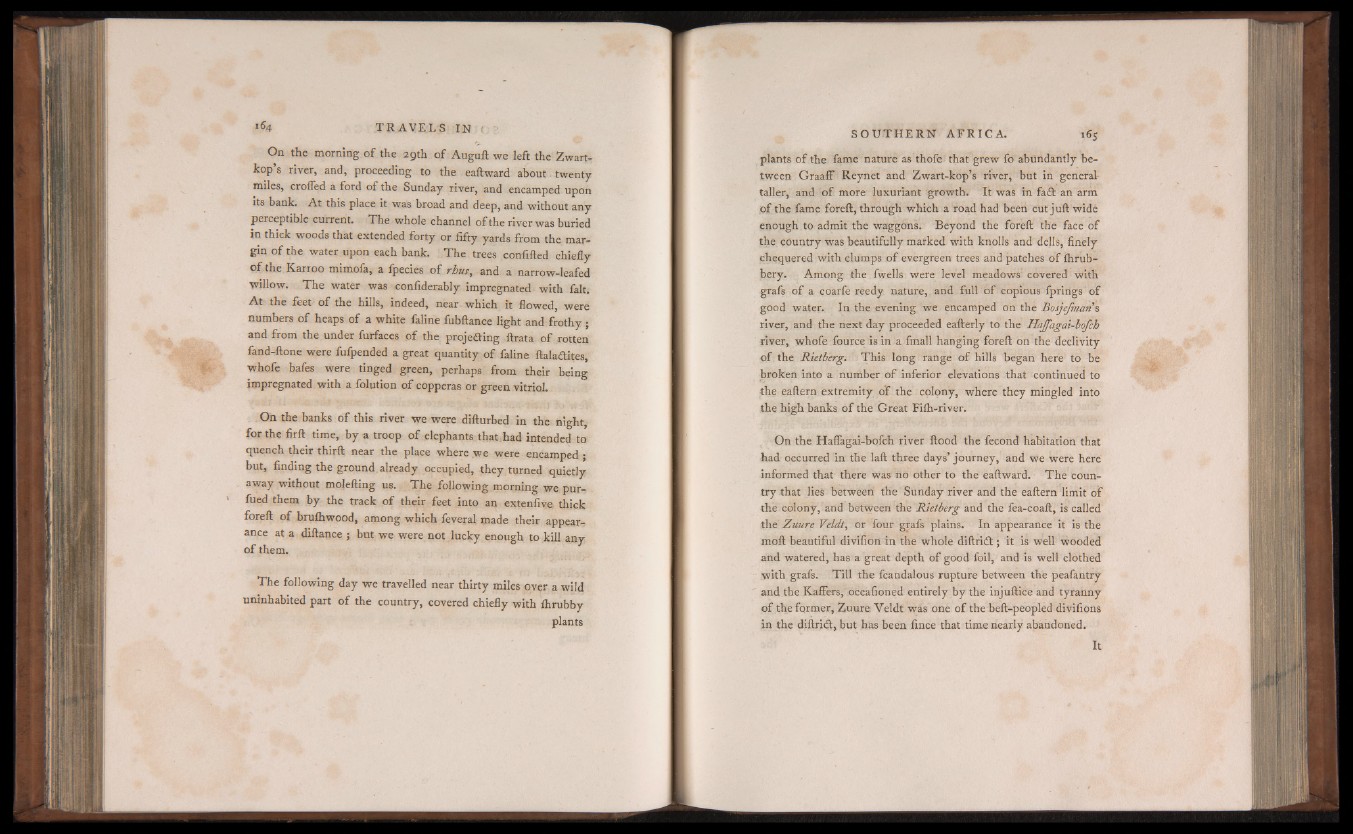
On the morning of the 29th o f Auguft we left the Zwart-
kop’s river, and, proceeding to the eaftward about twenty
miles, crofied a ford of the Sunday river, and encamped upon
its bank. At this place it was broad and deep, and without any
perceptible current. The whole channel of the river was buried
in thick woods that extended forty or fifty yards from the margin
of the water upon each bank. The trees confifted chiefly
o f the Karroo mimofa, a fpecies of rhus, and a narrow-leafed
willow. The water was confiderably impregnated with fait.
At the feet of the hills, indeed, near which it flowed, were
numbers o f heaps o f a white faline fubftance light and frothy ;
and from the under furfaces o f the projeaing ftrata of rotten
fand-ftone were fufpended a great quantity o f faline ftakaites,
whofe bafes were tinged green, perhaps from their being
impregnated with a folution o f copperas or green vitriol.
On the banks of this river we were difturbed in the night,
for the firft time, by a troop of elephants that had intended to
quench their thirft near the place where we were encamped j
but, finding the ground already occupied, they turned quietly
away without molefting us. The following morning we pur-
fued them by the track o f their feet into an extenfive thick
foreft o f bruihwood, among which feveral made their appearance
at a diftance ; but we were not lucky enough to kill any
of them.
The following day we travelled near thirty miles over a wild
uninhabited part o f the country, covered chiefly with Ihrubby
plants
plants of the fame nature as thofe that grew fo abundantly between
GraafF Reynet and Zwart-kop’s river, but in general
taller, and of more luxuriant growth. It was in faff an arm
of the fame foreft, through which a road had been cut juft wide
enough to admit the waggons. Beyond the foreft the face of
the country was beautifully marked with knolls and dells, finely
chequered with clumps o f evergreen trees and patches of fhrub-
bery. Among the fwells were level meadows covered with
grafs of a coarfe reedy nature, and full of copious fprings of
good water. In the evening we encamped on the Bosjefmans
river, and the next day proceeded eafterly to the Hajfagat-bofcb
river, whofe fource is in a fmall hanging foreft on the declivity
o f the Rietberg. This long range of hills began here to be
broken into a number of inferior elevations that continued to
the eaftern extremity o f the colony, where they mingled into
the high banks o f the Great Fiih-river.
On the Haflagai-bofch river ftood the fecond habitation that
had occurred in the laft three days’ journey, and we were here
informed that there was no other to the eaftward. The country
that lies between the Sunday river and the eaftern limit of
the colony, and between the Rietberg and the fea-coaft, is called
the Zuure Veldt, or four grafs plains. In appearance it is the
moft beautiful divifion in the whole diftriit; it is well wooded
and watered, has a great depth of good foil, and is well clothed
with grafs. Till the fcandalous rupture between the peafantry
and the Kaffers, occafioned entirely by the injuftice and tyranny
of the former, Zuure Veldt was one of the beft-peopled divifions
in the diftridt, but has been fince that time nearly abandoned.
It